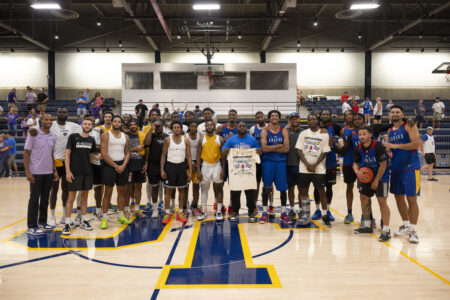Tom Keegan: Al Kelley represented ‘the greatest generation’ of Jayhawks

photo by: Photo courtesy of Kansas Athletics
Former KU men's basketball player Al Kelley, a member of the 1952 national championship team and 1960 Olympic gold medalist.
Al Kelley never did take me up on my standing offer, but that never stopped me from making it. He had my favorite laugh in Lawrence, deep and throaty, and I never grew tired of hearing it.
A member of the Kansas 1952 national-championship basketball team and a gold medalist for USA in the 1960 Olympics, Kelley backed up Oscar Robertson and Jerry West on that Olympic team. For those unaware that the NBA predated Air Jordan, The Big O and Mr. Clutch were the backcourt on just about every objective basketball fan’s all-time team before Magic Johnson and Michael Jordan came along.
My standing offer to Kelley was that any time he wanted to blast 1960 Olympic coach Pete Newell for not starting him ahead of Robertson and West, this space was all his. He would laugh and then talk about the greatness of the guards, Robertson out of Cincinnati, West out of West Virginia.
Kelley died at 83 Saturday and to say his warm smile and friendly manner will be missed by many would be an understatement akin to calling Allen Fieldhouse a pretty nice place to watch a basketball game.
That Olympic team for which Kelley played — he was also a member of the Caterpillar (the Peoria, Ill.-based company for which he worked) AAU champions — was elected to the Naismith Memorial Basketball Hall of Fame in 2010, 50 years after its world domination. The team’s average margin of victory of 42.4 points explains why many consider it to be the greatest amateur basketball squad of all time. That’s what happens when you put two all-time greats in the same backcourt. Robertson averaged a triple-double his second season in the NBA. West, whose silhouette is the NBA logo, was a great shooter, especially in the clutch, and far more than that. I once played 18 holes with Hall of Fame guard Calvin Murphy and asked him to identify the toughest defender he ever faced. Without hesitation, he answered West and said, “quickest hands I’ve ever seen.”
Kelley, I’m told, had quick hands too, sometimes so quick the refs didn’t see the physical defender chopping the ball-handler’s arms, forcing another turnover.
I met Kelley 11 years ago when I was brand new in town. He was having dinner at Conroy’s with wife of 61 years, Barbara, a master gardener, and friends Chuck and Kathy Heath. I introduced myself to Kelley and he was surprised I knew who he was. He had no clue he was a big deal, which made him all the more likable.
Kelley and other big shots of his era, Bill Hougland, Bill Lienhard, Jerry Waugh, Gary Padgett and the younger Harry Gibson always have been easy to spot at both crowded and sparsely attended Kansas sporting events. They don’t show up to be seen. They go to watch and discuss with one another and their wives which players and coaches they appreciate most, and quietly share whatever frustrations they might have about teams or players or coaches. After all these years, they love sports and love one another’s company. They really are such a cool part of the KU landscape.
Many of today’s athletes don’t necessarily know who they are, but the coaches certainly do. Volleyball coach Ray Bechard counted Kelley as a friend and loved seeing him in the crowd.
“You’ve got guys loving KU first and foremost, but I also think coming to those events still creates that opportunity for them to feel the competition,” Bechard said. “Obviously, they get to the point they can’t physically do that anymore, but what a great getaway to see Jayhawks competing at a high level.”
Bechard discussed the humble nature of Kelley, an Air Force veteran, and other lettermen from decades past.
“You wouldn’t know,” Bechard said. “I just think that’s part of that generation, the greatest generation, really, how they served our country and how they competed at a high level, but they didn’t really ever expect any added attention or any adulation.”
KU athletic director Sheahon Zenger loves seeing the lettermen at baseball games and women’s basketball games, volleyball matches and football games.
“They’re the connectors to what Bill (Self) calls the sweat,” Zenger said. “These buildings around here sweat tradition. Part of why they sweat is we still have these guys who connect us to that sweat. They’re part of our program, part of our daily lives, and not just basketball. Every sport we have, they support. I don’t know if there’s any other place in America that has that kind of support from that level of student-athlete.”
They stepped off the stage long ago and did so with such grace and humility. It’s how they do everything.







